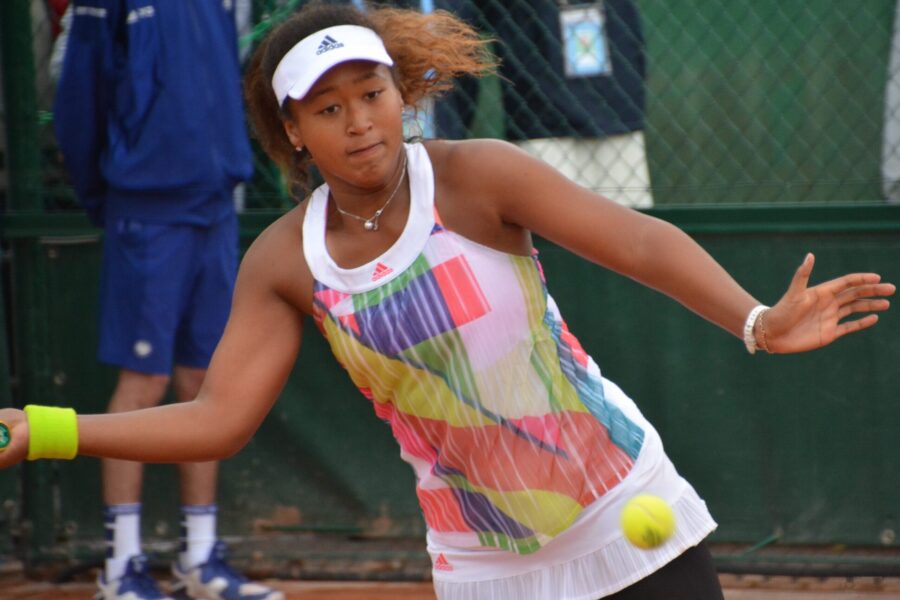Osaka’s Mental Health Discussion Resonates at French Open
Although Naomi Osaka left the 2022 French Open in the first round, her impact continues to resonate. She changed the atmosphere for all players after her transparency about anxiety and depression at last year’s Open.
According to a Washington Post article, when Osaka left the tournament last year after being fined for skipping her media obligations due to anxiety, she found herself under extraordinary media scrutiny and in a newfound place of influence. As she recounted via email to the Associated Press, “I remember after I got back from France last year and having photographers follow me even at random places like the grocery store. It felt really odd and a bit overwhelming, until one day a woman came up to me and told me that by speaking up, I helped her son. In that moment, it did all feel worthwhile.”
Osaka is not the only tennis player to admit to the grueling nature of the tennis circuit. But as a former No. 1-ranked player and four-time Grand Slam champion, her public withdrawal from Roland Garros helped bring mental health “out of the shadows.” This year the tournament established new “quiet rooms” and arranged to have three on-call psychiatrists present. And Osaka’s influence continues to be felt by players on tour:
- “I definitely think [mental health is] something that is paid attention to way more than it was, at least when I was coming up as a teenager. I don’t even think I knew what it was when back then. And we’re seeing people speak out and normalize it a bit in a way where it’s OK if you’re struggling with something — it doesn’t matter if it’s on the court, off court, whatever.” – Jessica Pegula, a 28-year-old from New York
- “Anytime an athlete shares their vulnerability and their authenticity, it’s going to affect other athletes in that sport. There’s a relatability.” – Becky Ahlgren Bedics, VP of Mental Health and Wellness for the WTA
- “Traveling every week. Never being home. The pressure of the rankings…it is an extremely mentally draining sport.” – Taylor Fritz, the highest-ranked American man at No. 14
- “All of us are humans. All of us have to deal with all of these mental struggles. We struggle. And it’s important that players like her talk about it.” – Paola Badosa, a 24-year-old from Spain
- “Definitely more and more players are speaking out on it or about it. Some are even taking time off to regroup and be away from the noise. There is, for sure, a lot of noise, especially when you’re in the spotlight or win big tournaments and there is a lot pressure to back it up. With social media now, it’s not an easy era. And one key is that you kind of have to know whose voice is important and whose voice you don’t need to focus on.” – 23-year-old Canadian Denis Shapovalov, a 2021 Wimbledon semifinalist
- “Sometimes, you don’t want to get vulnerable with each other. If you complain, then you’re called ‘soft.’ But when you think about it, you’re actually strong. Sometimes people really are going through a lot on the inside, but they hide it and try to put up a facade like they’re super tough. Sometimes you just need to verbalize it. You need a safe space to be heard.” – Frances Tiafoe, a 24-year-old from Maryland who considers Osaka a close friend
- “Now we have a lot more athletes who are discussing the importance of mental health in their careers. It’s really opened up the conversation to a lot more people and it’s created more positive conversation, which I think is really wonderful and I’m glad that that’s starting to happen.” – Rebecca Marino, a former top-40 player from Canada, who’s returned to the tour after a nearly five-year break due to depression
Although more work remains to be done to destigmatize mental health challenges, Osaka’s transparency is paving the way for others.
Read the Washington Post article here.
Fendrich, Howard. “Osaka’s mental health discussion resonates at French Open. The Washington Post, 25 May 2022, https://www.washingtonpost.com/sports/tennis/osakas-mental-health-discussion-resonates-at-french-open/2022/05/24/42ff25f4-dbb1-11ec-bc35-a91d0a94923b_story.html
Photo credit: Creative Commons Attribution-Share Alike 2.0



